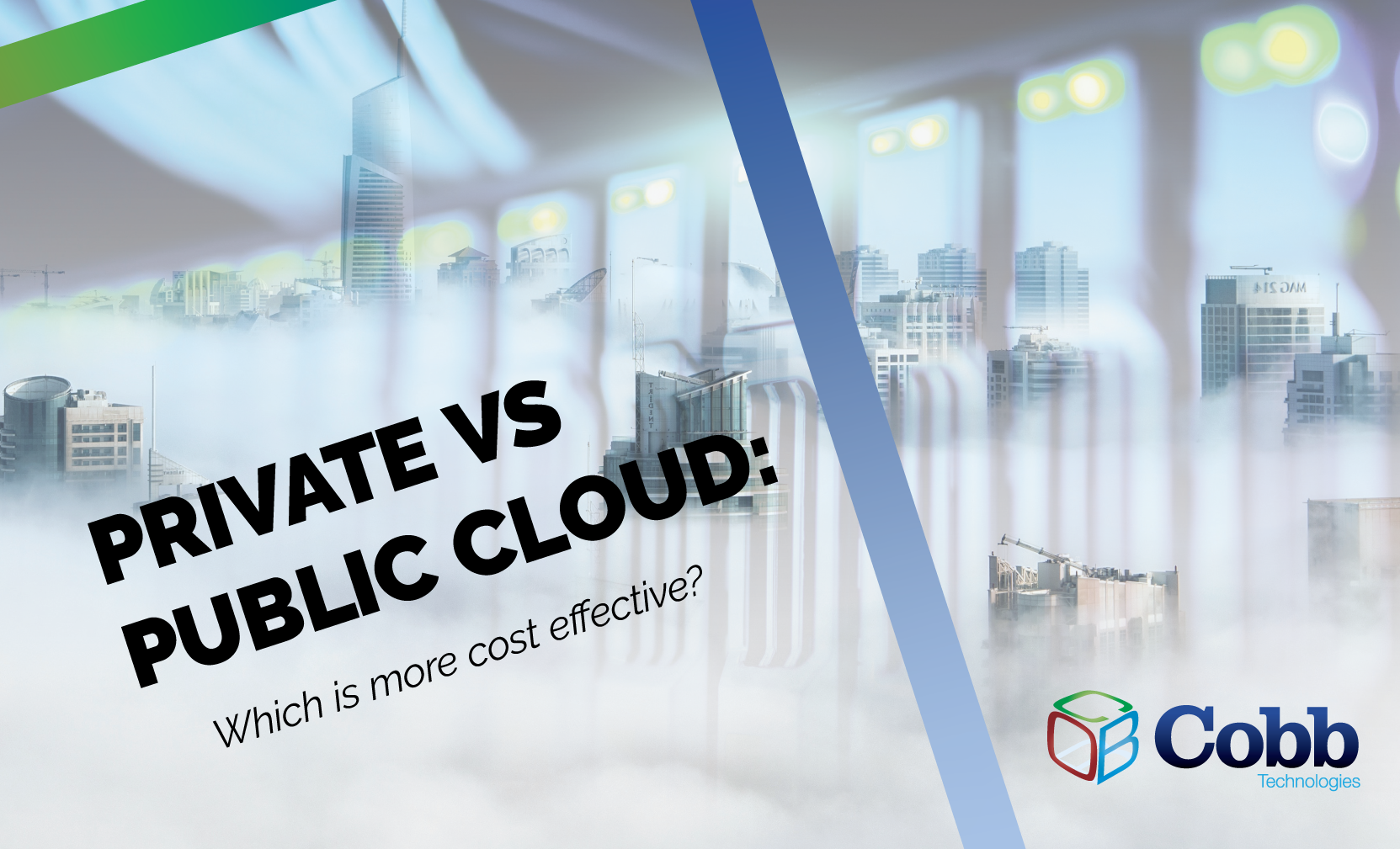3 min read
Building Culture That Works: Cobb Tech Named One of VA's Best
Cobb Technologies has been honored as one of the 2025 Best Places to Work in Virginia by Virginia Business and Best Companies Group. This prestigious...
4 min read
 Jason Holmes
Sep 9, 2021 1:58:30 PM
Jason Holmes
Sep 9, 2021 1:58:30 PM

Just like there are different cloud providers, such as Microsoft Azure, Google Cloud, or Amazon Web Services (AWS), there are different types of cloud hosting.
In this blog, you’ll learn all about the difference between Public and Private cloud hosting — if you’re looking for a breakdown of the differences between SaaS, PaaS, and IaaS, check out our blog, How Much Do Cloud Services Cost?
As mentioned above, public cloud hosting is provided by brand names you recognize. These are the stereotypical cloud centers — the huge, multiple-acre, measured in square miles warehouses that host the physical servers that run thousands and thousands of organizations’ cloud infrastructure, software, and security measures.
Public cloud services are deemed as such because if you rent a cloud server from a public provider, your data, programs, security, and infrastructure will live on the same hardware as another organization’s data, programs, security, and infrastructure.
Not just one, in fact, but thousands. It is important to make the distinction that just because your organization’s digital environment shares hardware with a multitude of other digital environments, your information is not accessible to them, just as their information is not accessible to you.
When you sign up for public cloud hosting, you are essentially making an agreement that another company will manage your data, programs, infrastructure, or whatever else you plan on hosting using their services. The way your data is managed is up to the cloud provider, not your business.
This isn’t to say your data will be mismanaged, or that it will be used in ways you didn’t consent to (in fact, public cloud providers can’t look at the data that is hosted on their servers) — merely that it is the cloud provider’s responsibility to manage the hardware your data is hosted on.
Public cloud providers manage, as stated above, thousands and thousands of different digital environments, as well as the physical servers the digital environments are stored on. When a physical server needs maintenance, the portion of your data that is stored on that server will be moved to another server in their hosting center.
This happens regularly, as server banks are maintained and updated to ensure there are no points of failure. In fact, the data of a single file could be hosted on multiple different pieces of hardware in a cloud provider’s warehouse. This is why cloud providers can boast 99.999% up-time. By decentralizing the storage of data, when there is an issue with one server, the rest can take on the extra burden.
Private cloud works pretty much the same as Public cloud hosting — your data is stored on servers that share the load of your digital environment: your files, applications, and infrastructure.
The difference is that your digital environment is the only data stored on those servers. Additionally, your organization is responsible for managing those servers, which can be handy when you belong to an industry that faces strict regulations, but requires that your IT department or MSP (Managed Service Provider) dedicates a substantial amount of time to managing your private cloud environment.
Other than that, private and public cloud hosting share the same technology, format, and methodology.
The short answer, when comparing private and public cloud, is that public cloud services cost less, take up significantly less time than private, but are less secure (with a caveat).
As mentioned above, private cloud services are great for businesses that are subject to strict regulations and need to implement higher security and data protection standards than are offered by public cloud providers.
Let’s get into the details:
When paying for public cloud hosting, you pay a set amount for storage, as well as data you download from your cloud host, or transfer data to another cloud provider. Data uploaded is not charged. The charges associated with data downloading range between $0.08 to $0.20 for every 1,000 to 10,000 requests.
To determine how your provider determines a “request,” you’ll need to speak to them directly.
When paying for private cloud hosting, you determine how much storage, compute, and bandwidth you need. Then, you pay for that amount every month, every year. You won’t have charges based on how much data you downloaded, but rather be charged based on the infrastructure responsible for downloading the data from the cloud.
Simply put, public cloud only charges you for what you use, but it charges you every time. Private cloud charges you for what you’ve reserved, regardless of how much you actually use in a given month, but allows you to make as many requests as your bandwidth can handle at zero cost for the data you use.
Without a doubt, public cloud hosting takes up less time than private. This is due to the nature of how these services are allocated; with public cloud, the provider manages the servers your data is stored on. You will never have to conduct server maintenance, or spend a single cent on upgrading or maintaining the hardware your data is stored on.
With private cloud, as mentioned above, you are responsible for managing your servers. This means your IT team will be responsible for keeping your servers up to date and running properly.
Even in terms of set-up, public cloud is faster — in fact, by the time you finish reading this blog, you could purchase, set up, and start running a public cloud server. Setting up a private cloud server, while less time intensive than setting up an on-premise server, will comparatively take days or weeks.
You may have noticed there was a caveat mentioned in regards to public versus private cloud security.
This is because private cloud has the potential to be more secure than public, but it requires that your IT team knows what to do, and has the time to do it.
Public cloud services provide their own security services, which are usually extremely robust. Because they host so much data, they are constantly monitoring for intrusions, as well as updating and strengthening their security whenever any new patch or exploit is made public.
With a private cloud service, you control the level of security present on it — meaning you can create an environment that is even more secure than a cloud data center — you just need to know how to do so.
Like most things in the world of tech, there’s a reason there are multiple options: there is no single best product. Private cloud is great for businesses that need the flexibility of the cloud, but need to control every aspect of their data.
Public cloud is best for businesses that need the benefits of the cloud without worrying about managing their data.
Be aware, however, that if both options sound like they would suit your business’ needs, you can create a hybrid public/private cloud environment. In fact, 97% of businesses make use of a hybrid cloud environment.
If you’d like to learn more about the cloud, check out our blog, Do I Need to Backup My Cloud Server?

3 min read
Cobb Technologies has been honored as one of the 2025 Best Places to Work in Virginia by Virginia Business and Best Companies Group. This prestigious...

5 min read
Cobb Technologies is honored to hold the SWaM (Small, Women-owned, and Minority-owned Business) certification, awarded by the Commonwealth of...

5 min read
Every year, thousands of Veterans transition from military service to civilian careers in Virginia, bringing invaluable skills and experiences to...